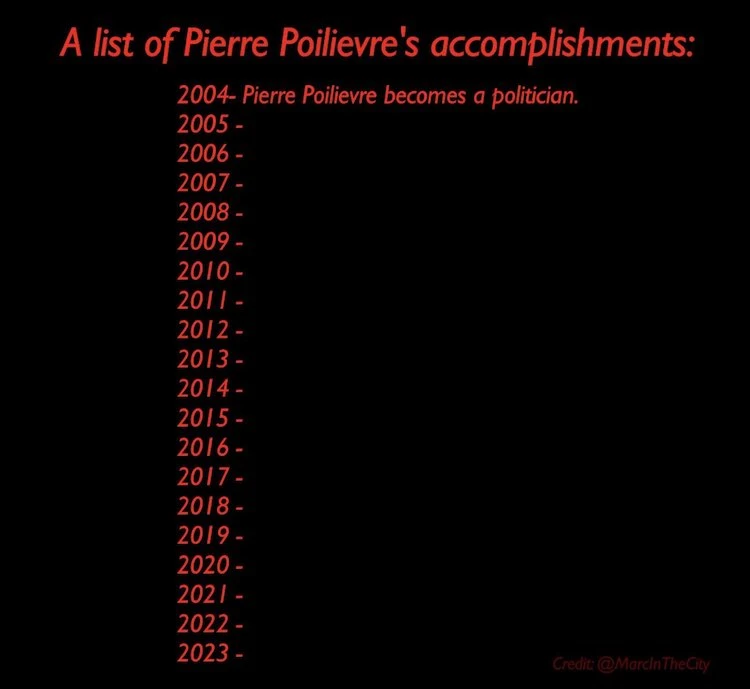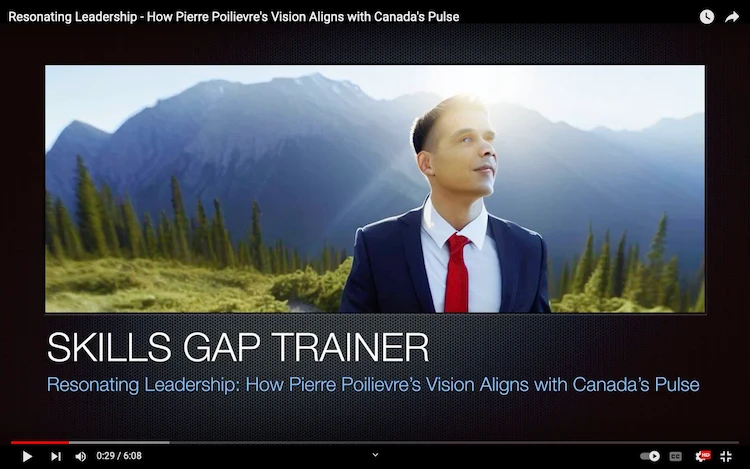Video: Resonating Leadership – How Pierre Poilievre’s Vision Aligns with Canada’s Pulse
YouTube Link: https://youtu.be/6lmDnQD9iTQ
In times of great challenge and change, leadership that understands the pulse of history, the movements of societies, and the collective strength and energy of a nation is not just essential — it’s transformative. Canada stands at a pivotal moment, facing internal and global shifts that require vision, determination, and a profound connection to the people.
Contrast this with some leaders who may seem disconnected or misdirected; figures like Pierre Poilievre or other members of the Conservative Party resonate with the hearts and minds of Canadians. Consider a simple comment such as how Poilievre mentioned the brave firefighters fighting wildfires in West Kelowna. This sentiment does more than just reflect words; it symbolizes a connection with the essence of leadership and general crowd intelligence. It illustrates an understanding of how members of society would respond in a rational, practical way to the challenges of the 21st century. This is precisely the leadership approach needed to tackle the obstacles that will present themselves in this new age of consequences.
Consider some of the many missed epic “megatrend” opportunities in our recent history:
Energy Innovation and Climate Change:
While the world advances in clean energy solutions, Canada could be leading rather than trailing. Pierre Poilievre recognizes the importance of clean energy systems, advanced energy systems, and the need for innovative approaches, such as tidal power and small modular reactors. Embracing clean energy projects like decentralized solar markets, nuclear power, and hydrogen combustion engine economy. He’s not afraid to engage in conversation with experts, even if they reside on YouTube.
Military Preparedness and Geopolitical Landscape:
Was the last four years of global conflict used as an epic historical turning point and motivating engine for Canada? There’s a need for Canada to strengthen its military and align with our allies in the multi-polar world order. Understanding military and strategic imperatives is essential. Isn’t this logical that a threat could mobilize workers to occupational success in building our nation? A leader such as Pierre or Conservative Party seems keen for capitalizing on historical opportunities for our success.
Rights, Freedoms, Civil Liberties, and Freedom:
During the period of 2019 to 2023, many Canadians lived in fear regarding their family rights, biological rights, cyber-security rights, web speech rights, brand speech rights, journalism rights, and firearm rights. Recognizing the fine line between regulation and suppression is essential. Instead, there seems to be a focus on “population control” by some leaders, who appear to miss the great historical opportunities for Canada, choosing instead to attack public firearms owners and to engage in sideshow battles, distracting severely from critical “megatrend” opportunities.
Natural Disasters Response:
The wildfires called for far-reaching plans for cities, providing an opportunity to tackle climate change. Where’s the plan that transcends the immediate and looks to the future? Are we capitalizing on the horrible fires to create climate change solutions as the engineering mindset of Pierre is most likely doing as we speak?
Economic and International Leadership:
Canada needs wise leaders who can guide the nation through global shifts, currency wars, and rapid purchasing power drops. Pierre’s decade of public work stands in contrast to the current leaders who are bringing decades of economic hardship and challenge. This is evident in the alteration of the debt to GDP ratio, a mathematical relationship that scales with the debt size increase. The current administration’s reckless handling of debt, without the associated productivity or industrial growth to match and balance it out, reveals a lack of foresight and understanding.
Crisis Management:
Turning crises into opportunities for collective growth is paramount. It is apparent that the Conservative Party and Pierre are engaging in the kind of analysis typically conducted by ‘engineers,’ ‘entrepreneurs,’ ‘data analysts,’ and ‘equities traders.’ In every twist and turn of their decision-making process, the solutions they arrive at seem to imply a kind of accurate evidence-based intelligence process. This means that the age of reason of the 20th century has survived within the Conservative Party. So not all of the progress of the 20th century was lost due to a type of de-evolution, as seen elsewhere. But Pierre and the Conservative Party champion a future of ongoing reasoning capability within Canada and ongoing problem-solving capability within Canada. In contrast, the current administration seems stuck in a mathematical quagmire, a mystery only the Gods might unravel.
21st Century Vision:
Utilizing crises for the common good, painting a picture of collective strength.
Conclusion
In conclusion, what Canada needs is a leadership style that is in tune with the currents of history, one that can harness the collective intelligence of its people and the collective desires and motivations and will of the people. It’s about recognizing the implicit solutions that are immediately apparent in the face of crisis. It’s a vision where the leader doesn’t fight against the people but with them when dangers strike, guiding them towards a path that resonates with our shared values and aspirations. That’s the leadership Canada needs, and it’s a vision many Canadians can stand behind, echoing themes of community, bravery, and collective responsibility that resonate deeply with the nation’s heart and soul. It’s why Pierre Poilievre’s and the Conservative Party voice resonates with us and with so many across the nation.
Related Content:
Video: Putting the pieces back together
YouTube Link: https://youtu.be/gudTpM3EgGM?si=7AuYL4kIZEiutgrs
Related Content:
Post on X:

Related books and resources:
“Leadership: Theory and Practice” by Peter G. Northouse – Provides a comprehensive exploration of leadership theories and practices, relevant to understanding Pierre Poilievre’s approach.
“The Quest: Energy, Security, and the Remaking of the Modern World” by Daniel Yergin – Explores global energy policy, aligning with discussions on Canada’s energy innovation.
“On Grand Strategy” by John Lewis Gaddis – Offers insights into strategic thinking and geopolitical landscapes, applicable to Canadian military preparedness and leadership in the global context.
“The Fifth Risk” by Michael Lewis – Delves into the importance of government in managing crises and innovations, relevant to crisis management and policy discussions in Canada.
“How Democracies Die” by Steven Levitsky and Daniel Ziblatt – Provides a look into the challenges facing modern democracies, relevant to discussions on rights, freedoms, and civil liberties in Canada.
“The Innovator’s Dilemma” by Clayton M. Christensen – Discusses how companies can fail by not adopting new technologies or strategies, relevant to economic leadership and innovation.
“The Righteous Mind: Why Good People Are Divided by Politics and Religion” by Jonathan Haidt – Explores the foundations of our moral choices, relevant to understanding public opinions and leadership strategies.
“The War on Normal People” by Andrew Yang – Discusses the impact of automation and technology on economies and societies, relevant to Canada’s future challenges and opportunities.
“Commanding Hope: The Power We Have to Renew a World in Peril” by Thomas Homer-Dixon – A call to action for addressing global crises with innovative solutions, applicable to Canadian leadership and global challenges.
To see our Donate Page, click https://skillsgaptrainer.com/donate

